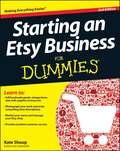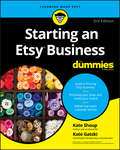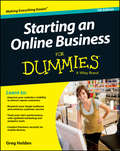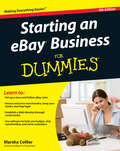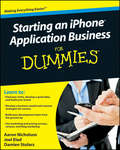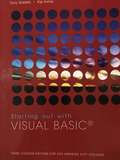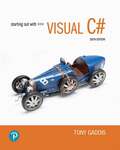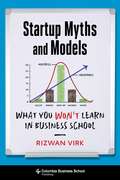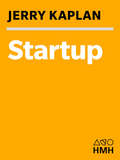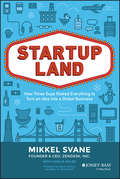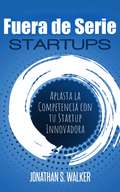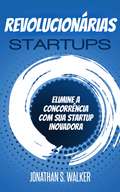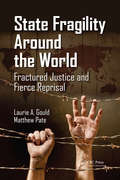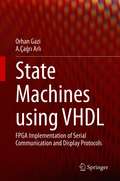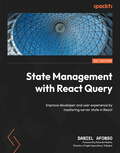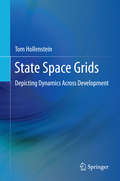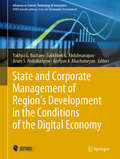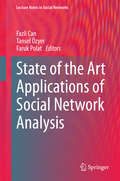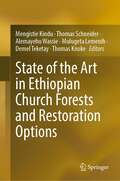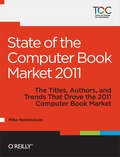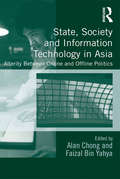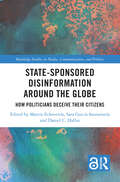- Table View
- List View
Starting an Etsy Business For Dummies
by Kate Shoup Kate GatskiThe easy way to build an online craft business from scratchStarting an Etsy Business For Dummies offers expert advice for artists and entrepreneurs looking to build an online craft business from scratch. You'll get invaluable information on how to set up an Etsy shop, write compelling item descriptions, photograph your work, engage the Etsy community, understand fees, and find your muse when it takes a holiday.In the last couple of years, the DIY movement has transcended the big-box hardware stores, and has taken on a new format in the savvy crafting arena. Starting an Etsy Business For Dummies shows you how to create, manage, and successfully sell handmade wares, vintage goods, and DIY supplies using the world's largest online handmade marketplace.Coverage new to this edition includes the latest in flash sale partners; best practices for applying SEO to your shop and listings; new tools for sellers; and much moreIncludes tips for increasing local sales by connecting with other local vendors through seller communitiesCovers harnessing the power of Pinterest to promote (and protect) your businessIf DIY is your domain, Starting an Etsy Business For Dummies gives you the skills, knowledge, and know-how to create a successful business that pays.
Starting an Etsy Business For Dummies
by Kate Shoup Kate GatskiBuild your own successful online business—the Dummies way Etsy is the premiere online marketplace for distinctive handmade and vintage crafts and goods. Starting an Etsy Business For Dummies, Fourth Edition provides you with the information and tools you need to start selling successfully on Etsy. This comprehensive resource and guide will show you how easy it is to set up shop and start generating income. There are millions of people out there looking to purchase unique products, and more and more shoppers are opting for one-of-a-kind sources over big-box stores. There’s never been a better time to open your own Etsy shop, and there’s never been an easier way than with this book. This updated edition covers all the latest changes to the site, plus shows you how to take captivating photos and short-form videos of your products, write appealing descriptions, and set up your Etsy shop in a way that motivates buyers to click that “add to cart" button. With helpful information, tips, tools, and tricks, this book is your ultimate guide to building your own Etsy shop. Learn the ins and outs of running a successful Etsy shop Get tips and advice for marketing and pricing your products competitively Break through the new shop barrier and start showing up in search results Improve your sales on Etsy with expert info on finding your customers This book is great for small business owners, artists, and entrepreneurs looking to build an online craft business on the Etsy platform.
Starting an Etsy Business For Dummies (Third Edition)
by Kate Shoup Kate Gatski Allison Strine<p>Turn your hobby into revenue with an expertly-run Etsy shop <p><i>Starting an Etsy Business For Dummies</i> is the all-in-one resource for building your own successful business. Arts and crafts are currently a $32 billion market in the U.S., and Etsy is the number-one way to grab a piece of it for yourself. Sales through the site are rising, fueled by Pinterest, Instagram, and other social media—so there's never been a better time to jump into the fray. This book shows you everything you need to know to get set up, get things running, and build your business as you see fit. From photography and sales writing, through SEO, homepage navigation, and more, you'll find it all here. <p>This new third edition has been updated to cover Etsy's newest seller tools, including Pattern, Etsy Manufacturing, Etsy Shop Updates, and the Dashboard, with expert guidance on QuickBooks Self-Employed to help you keep your business's finances under control. With helpful information, tips, tools, and tricks, this book is your ultimate guide to building your own Etsy shop. <p> <li>Showcase your products to their best advantage with great photographs and compelling listings <li>Learn the technical side of setting up shop and processing orders <li>Manage your storefront efficiently using the latest Etsy tools and features <li>Increase sales by connecting with other vendors and promoting on Pinterest</li> <p> <p>Are you an artist, crafter, artisan, or craftsman? Etsy can be another great revenue stream. Are you just curious about whether your projects would sell? Wade in gradually to test the waters. Etsy is home to businesses of many sizes and types, and <i>Starting an Etsy Business For Dummies</i> shows you how to stake your claim.</p>
Starting an Online Business All-in-One For Dummies
by Shannon Belew Joel EladEstablish a successful online business and grow your customer base Starting an Online Business All-in-One For Dummies is the compass you need to navigate the exciting world of e-commerce. You'll discover the latest web trends, learn the basics of designing a website, and get tips for creating a compelling online presence. Plus, the guidance inside helps you stretch your marketing muscles to boost your brand's visibility, from the basics to more advanced strategies. This updated edition also shows you how to build a print-on-demand business, generate opportunities with AI, and break into the international marketplace. Learn how to fund your online business idea Drive traffic to your website or social media page using search engine optimization Stand out from the competition with proven online business strategies Manage security risks and stay one step ahead of potential threats. Perfect for aspiring online entrepreneurs and established business owners aiming to enhance their digital footprint, this book will take you all the way from start-up to success.
Starting an Online Business for Dummies
by Greg HoldenYou've heard stories about people making their fortune creating Web sites and selling merchandise on the Internet. You've been eager to jump right in and take a shot at striking it rich, but you're not quite sure how to get started-or if you're business-minded and tech-savvy enough to succeed. Starting an Online Business for Dummies will show you how easy it is to get your ideas off the ground and on the Web. You'll be able to take advantage of everything an online business has to offer, without an MBA or years of experience! This updated, hands-on guide gives you the tools you need to: Establish and promote your business, advertise your site, build a business with online auctions, keep your business legal and lawsuit free, impress customers in the virtual world, publicize your business with Google, Yahoo!, and Microsoft, conduct electronic payments, and also utilize VOIP, site feeds, blogging, and affiliate marketing. You'll soon begin to realize that online business is not confined to large corporations or even businesses with storefronts. With this handy, straightforward guide, you will have your business online and ready to go in no time. There's also a chapter on hot new ways to make money online, such as selling on Amazon or promoting on Flickr. The 5th edition of Starting an Online Business for Dummies helps you help your business can reach its full potential!
Starting an eBay Business For Canadians For Dummies
by Marsha Collier Bill SummersTurn your hobby into a successful careerStarting an eBay Business For Canadians For Dummies covers the essentials an eBay user or budding entrepreneur needs to start a moneymaking venture by trading on eBay. Readers will discover not only the essentials of maximizing profits on eBay, but also how to run a smart eBay-based business. Topics include:Setting up basic auctionsBuilding a storeChoosing what to sellSetting good pricesStocking your storeroomDealing with sales taxesShipping domestically and internationallyCanadians selling on eBay deal with many unique concerns which will be addressed in this adapted best-seller.
Starting an eBay Business For Dummies, 4th Edition
by Marsha CollierThe gold standard for eBay users who want to get serious about selling Want to turn your eBay use into a steady revenue stream? Come to where everyone starts, with a copy of the latest edition of Starting an eBay Business For Dummies. EBay superstar author Marsha Collier packs the fourth edition of her mega-selling book with everything you need to know, from how to tap the explosive power of social media for promoting your business to the very latest on eBay?s fees and payment structure, how to maintain your own customer service center, ways to build an audience, and much more. Shows you how to lay the foundation for a business by setting up a store and reviews legal requirements and restrictions Helps you price and source your merchandise Explores how to attract an audience using social media through your own site Gives you a quick MBA in budgeting, money transactions, customer service, shipping, and more Offers insight on other sellers who have been successful on eBay and what you can learn from them Kick-start your eBay business and get profitable with this must-have guide from eBay superstar Marsha Collier.
Starting an iPhone Application Business For Dummies
by Damien Stolarz Joel Elad By Aaron NicholsonHow to create a profitable, sustainable business developing and marketing iPhone apps iPhone apps are hot; the average app is downloaded more than 30,000 times. If you have some great apps in mind, Starting an iPhone Application Business For Dummies will show you how to produce and market them effectively. Starting an iPhone Application Business For Dummies provides clear, reliable business information to help developers and entrepreneurs create a profitable, sustainable business in this new and exciting market. Identifies what goes into a successful iPhone application business Helps you find the market niche your applications can fill, market and promote your business, and build your brand Explains how to develop a pricing strategy, build your applications efficiently, and get them into the App Store Explores finding a sustainable revenue model, including free trials, social media models, ad-based revenue models, and subscription models Demonstrates effective ways to provide service and support to customers Written by a team that combines knowledge of iPhone app development with sound business experience Starting an iPhone Application Business For Dummies can help you turn your ideas into income.
Starting out with Visual Basic (3rd Custom LACC Edition)
by Tony Gaddis Kip IrvibeStarting out with Visual Basic. Third Custom Edition for Los Angeles City College.
Starting out with Visual C#
by Tony GaddisStarting Out with Visual C# is an ideal introductory Visual C# text for everyone, even if you do not have programming experience. Author Tony Gaddis uses step-by-step instructions that are supported by a GUI-based approach to encourage and motivate you as you learn to create event-driven, Visual C# applications. The hands-on tutorials feature clear, down-to-earth explanations and provide detailed walk-throughs that are easy to follow. The 6th Edition features new and updated discussions, sections and tutorials aligned to Microsoft Visual Studio 2022 and the latest versions of C# and .NET. A new Chapter 11 dives deeper into classes. It covers intermediate to advanced topics, including returning objects from methods; writing a ToString method; working with null; the this reference variable; copy constructors; aggregation and composition; anonymous objects; mutable and immutable classes; and class collaboration. This print textbook is available for students to rent for their classes. The Pearson print rental program provides students with affordable access to learning materials, so they come to class ready to succeed.
Startup Myths and Models: What You Won't Learn in Business School
by Rizwan VirkBudding entrepreneurs face a challenging road. The path is not made any easier by all the clichés they hear about how to make a startup succeed—from platitudes and conventional wisdom to downright contradictions.This witty and wise guide to the dilemmas of entrepreneurship debunks widespread misconceptions about how the world of startups works and offers hard-earned advice for every step of the journey. Instead of startup myths—legends spun from a fantasy version of Silicon Valley—Rizwan Virk provides startup models—frameworks that help make thoughtful decisions about starting, growing, managing, and selling a business. Rather than dispensing simplistic rules, he mentors readers in the development of a mental toolkit for approaching challenges based on how startup markets evolve in real life.In snappy prose with savvy pop-culture and real-world examples, Virk recasts entrepreneurship as a grand adventure. He points out the pitfalls that appear along the way and offers insights into how to avoid them, sharing the secrets of founding a startup, raising money, hiring and firing, when to enter a market and when to exit, and how to value a company.Virk combines lessons learned the hard way during his twenty-five years of founding, investing in, and advising startups with reflections from well-known venture capitalists and experts. His candid advice makes Startup Myths and Models an ideal guide for those readers just embarking on the startup life and those looking for their next adventure.
Startup: A Silicon Valley Adventure
by Jerry KaplanThe classic account of the early days of tech, named one of the 10 best business books of the year by Business Week: &“Riveting, wry, and often wise.&”—The Washington Post Jerry Kaplan had a dream: he would redefine the known universe (and get very rich) by creating a new kind of computer. All he needed was sixty million dollars, a few hundred employees, and a maniacal belief in his ability to win the Silicon Valley startup game. Kaplan, a well-known figure in the computer industry, founded GO Corporation in 1987, and for several years it was one of the hottest new ventures in the Valley. Startup tells the story of Kaplan's wild ride: how he assembled a brilliant but fractious team of engineers, software designers, and investors; pioneered the emerging market for hand-held computers operated with a pen instead of a keyboard; and careened from crisis to crisis without ever losing his passion for his revolutionary idea. Along the way, Kaplan vividly recreates his encounters with eccentric employees, risk-addicted venture capitalists, and industry giants such as Bill Gates and John Sculley. And no one—including Kaplan himself—is spared his sharp wit. &“What separates Kaplan&’s tale from other start-up stories is the insight he provides about dealing with two of America's largest computer companies—IBM and Microsoft…Readers interested in entrepreneurial adventurism will find Kaplan&’s tale entertaining.&”—Publishers Weekly &“Kaplan tells it with novelistic style replete with races against the clock and sharp character sketches…An insider's well-written story of the death of a new machine.&”—Kirkus Reviews &“A winner.&”—Wired
Startupland: How Three Guys Risked Everything to Turn an Idea into a Global Business
by Carlye Adler Mikkel SvaneThe real story of what it takes to risk it all and go for broke. Conventional wisdom says most startups need to be in Silicon Valley, started by young engineers around a sexy new idea, and backed by VC funding.<P><P> But as Mikkel Svane reveals in Startupland, the story of founding Zendesk was anything but conventional. Founded in a Copenhagen loft by three thirty-something friends looking to break free from corporate doldrums, Zendesk Inc. is now one of the hottest enterprise software companies, still rapidly growing with customers in 150 countries. But its success was anything but predestined. With revealing stories both funny and frank, Mikkel shares how he and his friends bravely left secure jobs to start something on their own, how he almost went broke several times, how they picked up themselves and their families to travel across the world to California and the unknown, and how the three friends were miraculously still together for Zendesk's IPO and (still growing) success. Much like Zendesk's mission itself--to remove friction, barriers, and mystery in order to make customer service easier and more approachable--Startupland removes some of the myths about startups and startup founders. Mikkel's advice, hard-won through experience, often bucks conventional wisdom and entrepreneurial tropes. He shares why failure (whether fast or slow) is awful, why a seemingly boring product or idea can be the most exciting, why giving back to the community is as important as the bottom line. From how to hire right (look for people who are not offended by swearing) to which personas generate the highest response rates, Mikkel answers the most pressing questions from the perspective of someone still in the trenches and willing to share the hard truth, warts and all. While there are books by consultants who tell you how to build businesses, or by entrepreneurs now running billion-dollar businesses, there are few books from people still in the trenches who acutely remember the difficult daily decisions, the thrill (and fears) of the early days, the problems that scale with growing a business, and the reason why they all went on the adventure in the first place. Startupland is indispensable reading for all entrepreneurs who want to make their ideas the next big thing. The book will inspire and empower you to follow your own dream and create your own story.
Startups Fuera de Serie: Aplasta la Competencia con tu Startup Innovadora
by Jonathan S. WalkerHaz que tu negocio comience como nunca antes con estas estrategias vitales ¿Deseas que tu startup pueda comenzar con el pie derecho sin mucho esfuerzo? ¿Necesitas una forma de atraer posibles inversionistas para obtener ventaja sobre la competencia? ¿Deseas obtener un impulso rápido para que tu startup crezca exponencialmente en los próximos meses? Te presentamos Startups Fuera de Serie: ¡Aplasta la Competencia con tu Startup Innovadora! Estrategias probadas para que lleves a su negocio a donde necesita ir. Estas son algunas de las cosas que aprenderás en este libro para que tu negocio tenga un gran comienzo: •Ganando tracción para tu inicio •Uso de correos electrónicos a tu favor •Aprovechando el Marketing de correos electrónicos (Estrategias principales para campañas) •Estrategias de marketing viral •Escalar de pequeño a grande •Cómo aprovechar el marketing de afiliados •Aprovecha el poder del mercadeo en red para tu inicio Y mucho, mucho más. ¡Obtén tu copia de este libro hoy mismo! No te pierdas los increíbles enfoques incluidos en este poderoso libro de estrategia empresarial. ¡El precio puede subir pronto así que date prisa! ¡Desplázate hasta la parte superior y presiona el botón "Comprar ahora" Hoy!
Startups revolucionárias: Elimine a Concorrência Com Sua Startup Inovadora
by Jonathan S. WalkerComece o seu negócio como nunca antes possível com essas estratégias vitais Deseja que sua startup comece da melhor maneira sem muito esforço? Você precisa atrair possíveis investidores para obter uma vantagem sobre a concorrência? Você quer ganhar impulso rápido para que sua startup cresça exponencialmente nos próximos meses? Apresentando Startups Revolucionárias: Esmague a Concorrência Com Sua Startup Inovadora! As estratégias comprovadas para levar sua empresa aonde ela precisa ir. Aqui estão algumas das coisas que você aprenderá neste livro para começar bem o seu negócio: Ganhando tração para sua startup Usando e-mails para sua vantagem Capitalizando no Marketing por Email (principais estratégias para campanhas) Estratégias de Marketing Viral Dimensionamento de Pequena para Larga Escala Como se Alavancar no Marketing de Afiliados Aproveitando o Poder do Marketing de Rede para sua Startup E muito, muito mais! Pegue sua cópia deste livro hoje! Não perca todas as coisas incríveis reunidas neste poderoso livro de estratégia de negócios. O preço pode subir logo, então se apresse! Vá até o topo e pressione o botão "Comprar agora" hoje!
State Fragility Around the World: Fractured Justice and Fierce Reprisal
by Laurie A. Gould Matthew PateFailed and fragile states often govern through the criminalization of otherwise inconsequential or tolerated acts. These weak states also frequently use kidnapping, murder, and other violent or oppressive tactics to maintain order and stay in power. State Fragility Around the World: Fractured Justice and Fierce Reprisal analyzes the path to state f
State Machines using VHDL: FPGA Implementation of Serial Communication and Display Protocols
by Orhan Gazi A.Çağrı ArlıThis textbook teaches students techniques for the design of advanced digital systems using Field Programmable Gate Arrays (FPGAs). The authors focus on communication between FPGAs and peripheral devices (such as EEPROM, analog-to-digital converters, sensors, digital-to-analog converters, displays etc.) and in particular state machines and timed state machines for the implementation of serial communication protocols, such as UART, SPI, I²C, and display protocols, such as VGA, HDMI. VHDL is used as the programming language and all topics are covered in a structured, step-by-step manner.
State Management with React Query: Improve developer and user experience by mastering server state in React
by Daniel Afonso Ricardo MestreBeat common challenges in data fetching and data mutations while learning one of the most popular libraries for managing server state in ReactPurchase of the print or Kindle book includes a free PDF eBookKey FeaturesLearn how state is split into server and client state and the common challenges with eachUnderstand how React Query addresses server state challenges by facilitating data fetching and mutationsApply the knowledge gained to improve developer experience and build applications with improved UXBook DescriptionState management, a crucial aspect of the React ecosystem, has gained significant attention in recent times. While React offers various libraries and tools to handle state, each with different approaches and perspectives, one thing is clear: state management solutions for handling client state are not optimized for dealing with server state. React Query was created to address this issue of managing your server state, and this guide will equip you with the knowledge and skills needed to effectively use React Query for state management. Starting with a brief history of state management in the React ecosystem, you'll find out what prompted the split from a global state to client and server state and thus understand the need for React Query. As you progress through the chapters, you'll see how React Query enables you to perform server state tasks such as fetching, caching, updating, and synchronizing your data with the server. But that's not all; once you've mastered React Query, you'll be able to apply this knowledge to handle server state with server-side rendering frameworks as well. You'll also work with patterns to test your code by leveraging the testing library and Mock Service Worker. By the end of this book, you'll have gained a new perspective of state and be able to leverage React Query to overcome the obstacles associated with server state.What you will learnGet to grips with state and how it's typically managedInstall and configure React Query and its DevtoolsManage server state data fetching with the useQuery hookCreate, update, and delete data using the useMutation hookEmploy React Query in combination with frameworks such as Next.js and RemixExplore MSW and the testing library to test React Query using components and hooksWho this book is forThe book is for React developers who want to improve their state management skills and overcome the hurdles brought about by server state while improving their developer and user experience. Basic knowledge of web development and React will assist with understanding key concepts covered in this book. JavaScript developers will also find it useful.
State Space Grids
by Tom HollensteinHuman development from birth through adulthood is a complex interplay of many interacting forces. Children's internal processes are manifest in behaviors that are sculpted by their experiences, most notably with primary caregivers. Because the discipline of psychology explores human behavior and cognition, the techniques employed for developmental analysis must be able to describe, depict, and quantify these complex processes. State Space Grids provides the framework, basic method, rationale, and advanced techniques for translating the behavior of children, adolescents, and parents into visible, traceable data. This seminar-between-covers takes readers step by step from conceptualization through implementation of projects, with examples from a range of current research within and outside child development. Links are included for the GridWare software program and related user resources. And although state space grids need not be used only to analyze dynamic systems, they serve as an excellent tool for honing systemic thinking. Key coverage in this volume includes: Dynamic systems and the origins of state space grids. The state of research using state space grids. Introducing GridWare and how it works. How to use state space grids, from idea through finished project. Within-grid and between-grid analysis. Conducting advanced analysis. State Space Grids is an essential reference for researchers across such disciplines as psychology, neuroscience, economics, computer science, and agricultural science.
State and Corporate Management of Region’s Development in the Conditions of the Digital Economy (Advances in Science, Technology & Innovation)
by Yakhya G. Buchaev Salikhbek G. Abdulmanapov Arsen S. Abdulkadyrov Arutyun A. KhachaturyanThis edited book presents scientific and practical recommendations for the successful state and corporate management of regional development under the conditions of the digital economy. These conditions have produced a number of changes. On the one hand, new aspects of regional economies, which require management, are emerging, above all, digital technologies that have to be understood by the population, employees in the labor market, and regional companies. On the other hand, new opportunities for improving practices in the state and corporate management of regional development on the basis of digital technologies are also emerging: e-government systems, digital marketing, online trade, “smart” regions, etc. This book provides an overview of the leading digital technologies and demonstrates how they can be used to improve modern practices in the state and corporate management of regional development in the digital economy. The authors develop the conceptual foundations and put forward practical recommendations. In closing, the authors’ conclusions and recommendations are applied to the example of modern Russia, ensuring the practical relevance of the research.
State of the Art Applications of Social Network Analysis
by Tansel Özyer Fazli Can Faruk PolatSocial network analysis increasingly bridges the discovery of patterns in diverse areas of study as more data becomes available and complex. Yet the construction of huge networks from large data often requires entirely different approaches for analysis including; graph theory, statistics, machine learning and data mining. This work covers frontier studies on social network analysis and mining from different perspectives such as social network sites, financial data, e-mails, forums, academic research funds, XML technology, blog content, community detection and clique finding, prediction of user's- behavior, privacy in social network analysis, mobility from spatio-temporal point of view, agent technology and political parties in parliament. These topics will be of interest to researchers and practitioners from different disciplines including, but not limited to, social sciences and engineering.
State of the Art in Ethiopian Church Forests and Restoration Options
by Thomas Schneider Demel Teketay Mengistie Kindu Alemayehu Wassie Mulugeta Lemenih Thomas KnokeThis book, with contributions from leading academics - and including reviews and case studies from Ethiopian Church forests - provides a valuable reference for advanced students and researchers interested in forest and other natural resource management, ecology and ecosystem services as well as restoration options. The book addresses various aspects including a general overview of Ethiopian church forests, the present role and future challenges of church forests. It also discusses their structure and diversity in the context of sustainability and discusses restoration options for surrounding landscapes, under consideration of the circumstances of the land and the needs of surrounding communities. The intended readership includes natural resource professionals in general as well as forestry professionals in particular (practitioners, policymakers, educators and researchers). The book will provide the reader with a good foundation for understanding Ethiopian forest resources and restoration options of degraded landscape.
State of the Computer Book Market 2011
by Mike HendricksonThis annual report examines the key trends and developments -- most notably, the demise of Borders -- that shaped the 2011 computer book market.
State, Society and Information Technology in Asia: Alterity Between Online and Offline Politics
by Alan Chong Faizal Bin YahyaMany maintain that the arrival of computers networked across sovereign borders and physical barriers is a liberating force that will produce a global dialogue of liberal hues but this book argues that this dominant paradigm needs to be supplemented by the perspective of alterity in the impact of Information Technology in different regions. Local experts draw upon a range of Asian cases to demonstrate how alterity, defined here as a condition of privileging the hitherto marginal and subterranean aspects of a capitalist world order through the capabilities of information and communications technologies, offers an alternative to the paradigm of inevitable material advances and political liberalization. Calling attention to the unique social and political uses being made of IT in Asia in the service of offline and online causes predominantly filtered by pre-existing social milieus the contributors examine the multiple dimensions of Asian differences in the sociology and politics of IT and show how present trends suggest that advanced electronic media will not necessarily be embraced in a smooth, unilinear fashion throughout Asia. This book will appeal to any reader interested in the nexus between society and IT in Asia.
State-Sponsored Disinformation Around the Globe: How Politicians Deceive their Citizens (Routledge Studies in Media, Communication, and Politics)
by Martin Echeverría, Sara García Santamaría and Daniel C. HallinThis book explores the pervasive and globalised trajectory of domestic disinformation. It describes specific operations and general apparatuses of disinformation that are sponsored by the State institutions in several countries around the world, such as governments, political parties, and politicians.With an international team of expert authors, this volume meticulously scrutinises instances of State-sponsored disinformation across a diverse spectrum of 14 countries encompassing Western and Eastern Europe, North and Latin America, Africa, Asia, and the Middle East. It examines how political landscapes amplify or constrain disinformation, advancing a comprehensive understanding of its dynamics in the contemporary global milieu. The book is organised in three sections that gather case studies from democratic, non-democratic, and transitional regimes.Advancing the field of misinformation and disinformation studies by specialising in State-sponsored operations and their consequences, this book will be an essential volume for scholars and upper-level students of media and communication studies, journalism, political communication, disinformation and misinformation, social media, sociology, and international politics.The Open Access version of this book, available at http://www.taylorfrancis.com, has been made available under a Creative Commons [Attribution-Non Commercial-No Derivatives (CC-BY-NC-ND)] 4.0 license
